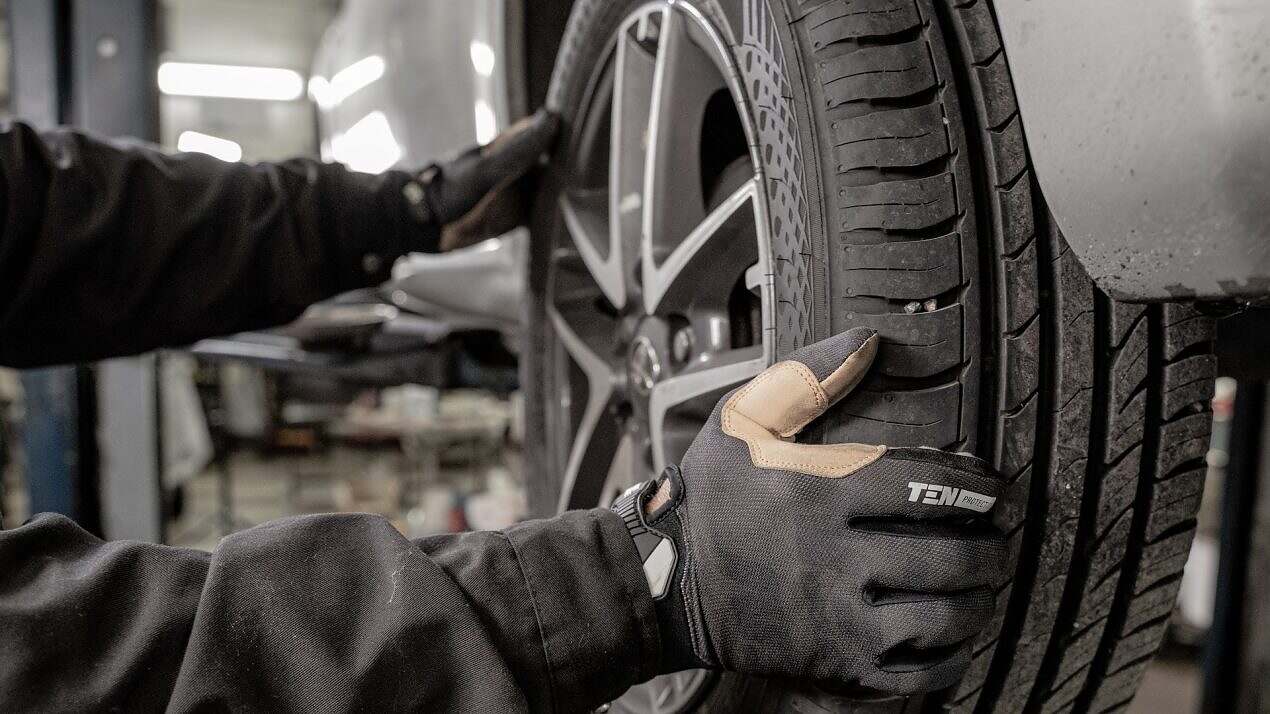If you’ve ever wondered about the differences between nitrogen or regular air in tires, you’re not alone. Both types of tire inflation methods have their merits and disadvantages.
Each has its pros and cons, depending on the situation. So which one is better for your car? Both nitrogen and air are useful ways to pressurize a tire. Let’s take a look at what they have in common as well as what makes them different from one another.
What is nitrogen?
Nitrogen is one of the most common elements found in the earth’s atmosphere. It makes up 78% of the earth’s atmosphere, compared to only about 0.03% of the earth’s atmosphere being made up of oxygen.
Nitrogen is used in tire inflation – especially in new cars – for one crazy reason. Molecules of Nitrogen are bigger than the same number of air atoms clumped together – science.
It’s estimated that tire and wheel manufacturers lose roughly $8 million a year due to tire pressure loss due to moisture. The reason for this is that oxygen and nitrogen are not easily attracted to each other. But Oxygen is way more promiscuous – it binds with everything, Iron, Magnesium, Hydrogen, etc.
That’s why Mars is red – science ?.
This means that if you use regular air in your tires, some of the oxygen will be attracted to the oxygen in the air. Nitrogen, on the other hand, isn’t attracted to oxygen at all, so this isn’t something you have to worry about when using nitrogen in tires.
Another reason is that nitrogen is less expensive than air. It’s always about saving money with every car brands. Right?
Air vs. Nitrogen: Which is better for your car?
After reading this article your choice just be based on your preference since they both have pros and cons. How technologically advanced your car is may force you to make a choice.
Let’s talk about whether or not your car has a tire pressure monitoring system (TPMS). This is a system that runs a pressure sensor on each tire and alerts the driver if any tire pressure is below what it should be.
If your car is equipped with a TPMS, then you can only use air in your tires. Using nitrogen in tires that have a TPMS installed may cause an alert to appear on the dashboard. This is because nitrogen isn’t detectable by most of these sensors.
Pros of Using Nitrogen in Tires
Nitrogen doesn’t easily mix with the components in the air (Hydrogen, Oxygen). This means that your tires will be properly inflated for longer.
This is a great advantage compared to regular air since tires that are properly inflated will improve gas mileage, help your car handle better, and reduce the risk of a blowout.
Nitrogen is less likely to leak out of your tires. This is because the molecules in nitrogen are larger than the molecules in the air. Larger molecules are harder to push out of the tire by the force of the wheel against the road.
Cons of Using Nitrogen in Tires
You have to replace the nitrogen occasionally. Regularly replacing the nitrogen in your tires is recommended, but it’s not required. Still, it’s something that you’ll need to keep track of. Plus, it can be a bit of a hassle to do it properly.
It costs money to use nitrogen in tires. There is an upfront cost to replacing the tires with nitrogen. You’ll also need to factor in the cost of replacing the nitrogen every so often.
Using nitrogen in tires that have a tire pressure monitoring system (TPMS) installed will cause an alert to appear on the dashboard. This is because nitrogen isn’t detectable by the sensor.
Pros of Using Air in Tires
Air is more readily available than nitrogen (air is free, but the tire inflation machine isn’t). This means that you’ll be able to find places that can fill up your tires with air much easier than you’ll find places that will fill up your tires with nitrogen.
While nitrogen is a great inflation medium, it won’t extend the life of your tires. Air, on the other hand, is a great inflation medium for both long and short-term use.
You can still find a place to fill up your tires with air even if you don’t have a nitrogen system set up at your home.
Cons of Using Air in Tires
Regular air is less durable than nitrogen in your tires (it will deflate quicker than pure Nitrogen). This means that it will typically require more frequent tire inflation than nitrogen.
Air is more likely to leak out of the tires than nitrogen. Air molecules are smaller than the molecules in nitrogen. Smaller molecules are easier to push out of the tire by the force of the wheel against the road.
Final Words
As you can see, there are quite a few differences between nitrogen in tires and air in tires. While both are useful ways to pressurize your tires and are generally safe.
It comes down to the molecules, they behave very differently from one another. Nitrogen is much more durable than air, but it’s also much harder to find.
Air is much easier to find, but it’s also less durable. Ultimately, it’s up to you which one you want to use.



